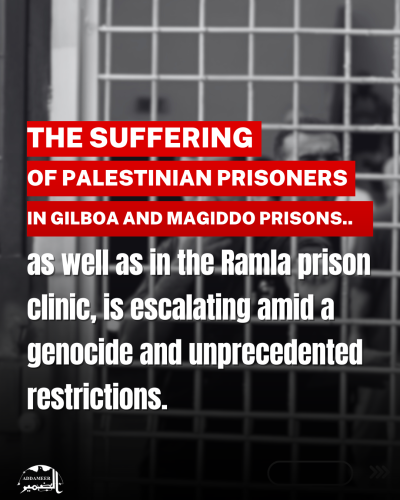
In the context of the genocidal war waged by the Israeli occupation on the Gaza Strip since October 7, 2023, alongside the ongoing aggression against the West Bank, including Jerusalem, the conditions inside Israeli prisons have become catastrophic, further compounding the suffering of Palestinian prisoners. They are subjected to a systematic campaign of abuse, starvation, and deliberate medical neglect, coinciding with widespread arrest campaigns across cities, villages, and refugee camps, which have led to a massive increase in the number of prisoners and detainees.
Gilboa Prison:
Prisoners in Gilboa Prison have reported that food and water conditions remain catastrophic. Only three meals are served per day, barely equivalent to one proper meal. The number of bread loaves has been drastically reduced, as part of a systematic starvation policy, leading to significant weight loss. Prisoners also lack the most basic elements of a dignified life—there isn’t even a wall clock in the section. Additionally, an unidentified virus is spreading inside the prison, causing severe diarrhea and intense abdominal pain, without any medical intervention from the prison administration. Furthermore, scabies is prevalent across most prisons and sections, with no adequate treatment provided.
Regarding personal hygiene, the prisoners live in deplorable conditions reflecting deliberate neglect. They are provided with extremely limited quantities of cleaning and disinfecting materials, insufficient to meet basic needs. This environment fosters the spread of skin and viral diseases. Personal hygiene items like shampoo and toothpaste are severely limited, and basic tools such as toothbrushes are not provided, making personal care nearly impossible and reinforcing a degrading and inhumane reality.
Prisoners are also deprived of the simplest personal items: they are not allowed to possess a comb or nail clippers. Electric shavers are only available in some sections, exacerbating general hygiene deterioration and the spread of skin diseases. Each prisoner receives only one roll of toilet paper per week—far from enough to meet daily needs.
Prisoners are denied regular recreational time, limited to just one hour per week in overcrowded and unsuitable conditions. This hour often takes place when the sun is not out, depriving prisoners of ventilation and natural light. One prisoner reported not having been exposed to sunlight for more than twenty days.
Searches are conducted once a month, during which prisoners are sometimes shackled and beaten without justification. In March, a prisoner was subjected to severe punishment after his room was raided, and he was physically assaulted—a beating that also affected all the prisoners in the room. Moreover, there is a severe shortage of summer clothing, adding to the prisoners’ suffering in the rising heat.
Among the documented critical health cases is that of prisoner (A.N.), who has been held under administrative detention for 18 months and suffers from diabetes and scabies. His body is covered in a widespread rash, including the palms of his hands, accompanied by frequent wounds and severe itching that affects his mobility. He has lost around 40 kilograms and cannot stand for more than two minutes without losing consciousness. Despite the severity of his condition, there is clear medical neglect—no actual treatment or monitoring is being provided, exacerbating his suffering and endangering his life.
Megiddo Prison:
In Megiddo Prison, prisoners are subjected to harsh and brutal treatment, including arbitrary and unjustified beatings, reflecting a systematic policy of intimidation and humiliation. A punishment imposed on prisoners involves confiscating their mattresses during the day and returning them only at night, to inflict psychological and physical torture amid inhumane conditions.
Scabies is widespread among the prisoners, amidst total medical neglect and the complete absence of treatment. Life becomes unbearable due to constant itching and worsening wounds. The suffering is further intensified by the extremely limited supply of shampoo, which doesn’t meet even the most basic hygiene standards. Prisoners are allowed out for recreation only one hour per day, usually during times without sunlight, depriving them of natural light and ventilation. The water provided to them appears dirty and discolored, posing a significant health risk.
The health situation in Megiddo is catastrophic. Several prisoners suffer from a virus causing severe abdominal pain and diarrhea, with no treatment provided, in blatant disregard for their lives. Food conditions are equally harsh: meals are insufficient and sometimes even spoiled, failing to meet basic nutritional needs and putting prisoners' health at constant risk. Under these dire conditions, most prisoners are also deprived of appropriate summer clothing, with only a few receiving any, reflecting a deliberate policy to exacerbate their suffering in extreme heat.
Ramla Prison Clinic (Marash):
At the Ramla Prison Clinic, the guards provide minimal supervision of sick prisoners, leaving their conditions without regular monitoring—despite their illnesses and need for consistent medical oversight. The prison clinic's follow-up is limited to routine treatments like dialysis, while other medical conditions are neglected, and necessary medications are not sufficiently provided.
In terms of food, prisoners suffer from poor quality and quantity. Recreation time is limited to one hour a day, usually not during sunny hours, depriving them of fresh air and natural light. One of the prisoners, despite not being a medical professional, is tasked with caring for wounds, distributing food, and doing laundry—roles neglected by the prison administration despite their essential nature.